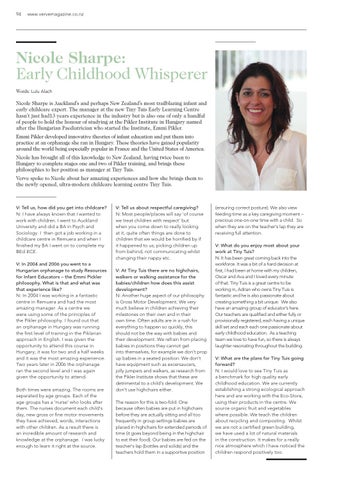94
www.vervemagazine.co.nz
Nicole Sharpe: Early Childhood Whisperer Words: Lulu Alach
Nicole Sharpe is Auckland’s and perhaps New Zealand’s most trailblazing infant and early childcare expert. The manager at the new Tiny Tuis Early Learning Centre hasn’t just had13 years experience in the industry but is also one of only a handful of people to hold the honour of studying at the Pikler Institute in Hungary named after the Hungarian Paediatrician who started the Institute, Emmi Pikler. Emmi Pikler developed innovative theories of infant education and put them into practice at an orphanage she ran in Hungary. These theories have gained popularity around the world being especially popular in France and the United States of America. Nicole has brought all of this knowledge to New Zealand, having twice been to Hungary to complete stages one and two of Pikler training, and brings these philosophies to her position as manager at Tiny Tuis. Verve spoke to Nicole about her amazing experiences and how she brings them to the newly opened, ultra-modern childcare learning centre Tiny Tuis.
V: Tell us, how did you get into childcare? N: I have always known that I wanted to work with children. I went to Auckland University and did a BA in Psych and Sociology. I then got a job working in a childcare centre in Remuera and when I finished my BA I went on to complete my BEd ECE. V: In 2004 and 2006 you went to a Hungarian orphanage to study Resources for Infant Educators – the Emmi Pickler philosophy. What is that and what was that experience like? N: In 2004 I was working in a fantastic centre in Remuera and had the most amazing manager. As a centre we were using some of the principles of the Pikler philosophy. I found out that an orphanage in Hungary was running the first level of training in the Piklarian approach in English. I was given the opportunity to attend this course in Hungary; it was for two and a half weeks and it was the most amazing experience. Two years later in 2006 the orphanage ran the second level and I was again given the opportunity to attend. Both times were amazing. The rooms are separated by age groups. Each of the age groups has a ‘nurse’ who looks after them. The nurses document each child’s day, new gross or fine motor movements they have achieved, words, interactions with other children. As a result there is an incredible amount of research and knowledge at the orphanage. I was lucky enough to learn it right at the source.
V: Tell us about respectful caregiving? N: Most people/places will say ‘of course we treat children with respect’ but when you come down to really looking at it, quite often things are done to children that we would be horrified by if it happened to us; picking children up from behind, not communicating whilst changing their nappy etc. V: At Tiny Tuis there are no highchairs, walkers or walking assistance for the babies/children how does this assist development? N: Another huge aspect of our philosophy is Gross Motor Development. We very much believe in children achieving their milestones on their own and in their own time. Often adults are in a rush for everything to happen so quickly, this should not be the way with babies and their development. We refrain from placing babies in positions they cannot get into themselves, for example we don’t prop up babies in a seated position. We don’t have equipment such as excersaucers, jolly jumpers and walkers, as research from the Pikler Institute shows that these are detrimental to a child’s development. We don’t use highchairs either. The reason for this is two-fold. One because often babies are put in highchairs before they are actually sitting and all too frequently in group settings babies are placed in highchairs for extended periods of time (it goes beyond being in the highchair to eat their food). Our babies are fed on the teacher’s lap (bottles and solids) and the teachers hold them in a supportive position
(ensuring correct posture). We also view feeding time as a key caregiving moment – precious one-on-one time with a child. So when they are on the teacher’s lap they are receiving full attention. V: What do you enjoy most about your work at Tiny Tuis? N: It has been great coming back into the workforce. It was a bit of a hard decision at first, I had been at home with my children, Oscar and Ava and I loved every minute of that. Tiny Tuis is a great centre to be working in, Adrian who owns Tiny Tuis is fantastic and he is also passionate about creating something a bit unique. We also have an amazing group of educator’s here. Our teachers are qualified and either fully or provisionally registered, each having a unique skill set and each each one passionate about early childhood education. As a teaching team we love to have fun, so there is always laughter resonating throughout the building. V: What are the plans for Tiny Tuis going forward? N: I would love to see Tiny Tuis as a benchmark for high quality early childhood education. We are currently establishing a strong ecological approach here and are working with the Eco-Store, using their products in the centre. We source organic fruit and vegetables where possible. We teach the children about recycling and composting. Whilst we are not a certified green building, we have used a lot of natural materials in the construction. It makes for a really nice atmosphere which I have noticed the children respond positively too.
